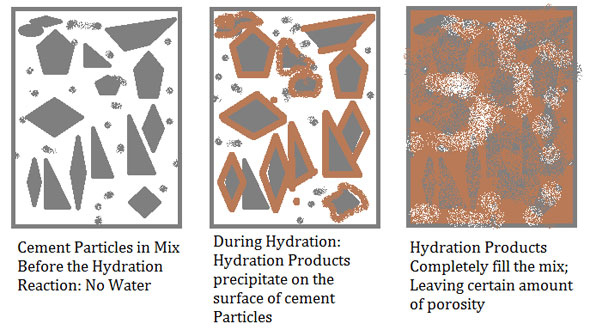Cement Hydrates - Process and Various Stages
- Concrete Cost Estimator
- Concrete Continuous Footing
- Landscape Bidding and Estimating
- Construction Cost Estimating
- Concrete and steel cost estimation
- Construction Cost Estimate Breakdown
- Construction Estimating Worksheet
- Home Construction Cost Estimate
- Estimate Pricing Sheet
- Sheet for General Contractor
- Construction Cost Estimate
- Labor Materials Cost Estimator
- Masonry Estimating Sheet
- Sheet for Building Contractor
- Construction Schedule Bar chart
- General Cost Estimator Sheet
- General Construction Estimate
- Building and Road Estimating Sheet
- Detailed expense estimates
- Door and Window Takeoff Sheet
- General Construction Cost Estimating Sheet

Hydration means series of irrecoverable exothermic chemical reactions among cement and water. Cement water paste sets and becomes solidified and bind the aggregate together in a solid mass.
Development of hydration products in the course of time produce the following results :-
1. Stiffening (loss of workability)
2. Setting (solidification)
3. Hardening (strength gain)
Hydration plays an important role due to the following factors :-
1. Secure the strength and stability of concrete
2. Identify and reduce the stress to get rid of cracking
3. Leads to good curing and construction practices
Hydration Process:
1. Cement grains in water
2. Formation of colloidal coating of calcium silicate hydrate (CSH) get.
3. Local disruption and secondary development of CSH get. Some crystallization of calcium hydroxide.
4. Further growth of CSH gel and infilling by CSH gel and Ca(OH)2 crystals.
Phase 1 : Mixing/Dissolution Phase (<15 minutes)
Sulfate reacts with aluminate and water to develop C-A-S-H, a precursor to ettringite. The gel restricts the access of water to aluminate.
Phase 2 : Dormant/Induction Period (2-4 hours)
During this dormant period, the silicates (alite and belite) gradually dissolve and discharges calcium ions in solution.
Also Read: How to estimate material quantities in cement concrete
Throughout dormancy; prior to initial set; the mix is moved, placed, finished and textured.
Phase 3 : C-S-H fiber like particles & CH develops and facilitates concrete to gain its strength. Heat is produced for thermal expansion.
Initial and final set happen. The gel-like C-A-S-H is changed to a needle like solid (ettringite) that partially allows to gain initial strength. Curing should be done immediately after finishing.
Phase 4 : Cooling/Deceleration Phase (several hours)
After final set, the formation of C-S-H and CH starts to restrict entry of water to unidentified cement.
1. Silicate reactions slow
2. Heat gains and starts to fall
3. Concrete cools and contracts
4. Cracking may happen
Phase 5 : Densification/Steady Stage (proceed for years)
Belite reactions start and proceed for years. Belite reactions also generate C-S-H and CH and creates a solid mass.
Longer length of this phase can provide the following results :-
1. Superior strength of concrete
2. Lesser permeation
3. Better longevity
To keep up continued hydration, moisture should be kept in the slab for a long period.

- Application of concrete calculator
- Roofing Calculator can streamline the roof estimating process
- House construction cost calculator
- Engineering column design excel spreadsheet
- Material Estimating Sheet with Excel
- Materials List and Cost Estimate Worksheet
- Concrete Slab Estimating Calculator Sheet
- Common types of foundations for buildings
- Online calculation of construction materials
- Estimating with Excel for the Small Contractor
- Concrete Beam Design Spreadsheet
- Virtual Construction Management app for construction
- Autodesk’s Project Skyscraper
- Reed Construction’s Reed Insight
- Manage your construction project documentation
- Costimator, the popular cost estimating software
- On Center Software for construction professionals
- Free Construction Estimating Software
- Plumbing Calc Pro
- Cost Estimate Worksheet
- HVAC Piping Quantity Takeoff Worksheet
- Construction Estimating Software Sheet
- Estimate Cost Templates
- Construction Punch List
- Construction cost estimating template consisting estimating basic
- Gantt Chart Template for Excel
- Download Civil Engineering Spreadsheets with Verification
- The Building Advisor Estimating and Budgeting Worksheet
- Spreadsheet for design of concrete bridge
- Construction Estimating Software Free








